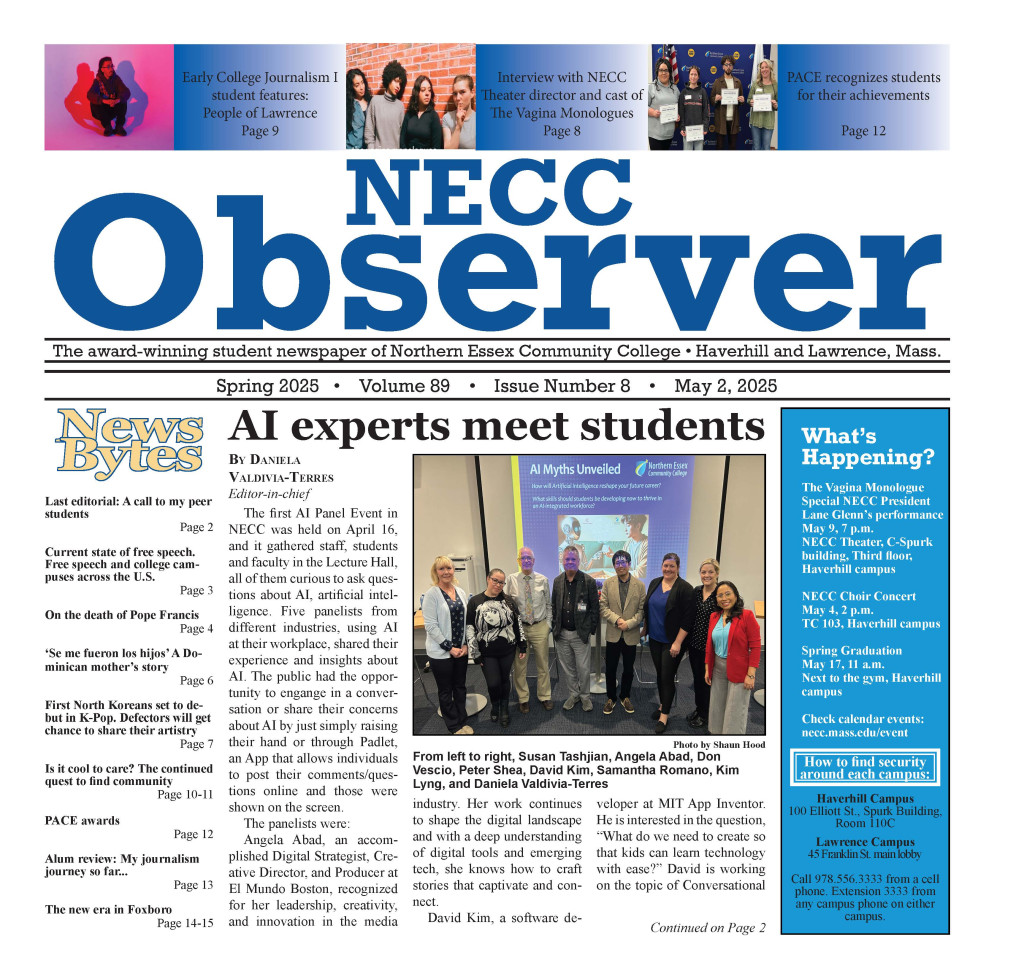Advertising is a billion-dollar industry marketed globally to millions and is often the reason why people want the newest, trendiest, or most expensive luxuries and experiences in life.
Popular products extending from fashion and technology, to food and culture, are displayed everywhere throughout television and social media for the sole purpose of selling a product.
Many believe that the influence of advertisement on a population even plays a large role—consciously and subconsciously—in molding our personal principles, perceptions, and opinions.
After speaking with several NECC students, most have expressed both positive and negative positions concerning the influence of advertisement in the entertainment industry.
“To me, an advertisement is an announcement or notice via any media to promote a product or event.” Said Isa Grullon, 34, a journalism and communications major from Lawrence who is also the editor-in-chief of the Observer.
“I definitely think that advertisement helps to shape our consciousness in everyday life. It is a very strategic pursuit and there is a whole psychology behind it. They [advertisers] don’t tell you what to think, but they can tell you what to think about,” said Grullon.
She further explained how, in her opinion, certain advertisements may also lead to cultural appropriation — in which trends are stolen, distorted, and Americanized from the form in which they were originally derived (i.e., Boxed-braids, Chinese food, slang). When asked about the impact of advertisement regarding social media platforms, Grullon stated, “I’m personally fine with social media apps marketing to me because I’m not going to fall for it. But there are people out there that are more naïve — especially young teenagers or older people — who have no idea how social media can target or place them in a certain category. I feel that in general, social media is not the greatest for society.”
Grullon’s evolved understanding of advertisement, she says, has enabled her to feel less inclined to buy or need the products advertised to her through the entertainment industry. Despite this understanding, however, she also confessed that the advertisement of Snickers candy bars does occasionally take advantage of her perception. “I can’t lie, sometimes when I see a Snickers commercial, I’m like I want a Snickers bar now. And that’s how they play with your mind.” Said Grullon.
According to Serai Bogran, 19, a film major from Haverhill, “advertisements are often used in a negative way and can cause more harm than good.”
Bogran further expressed how she personally doesn’t feel the need to buy what she sees on television, despite knowing that many others struggle with this compulsion.
As various social media platforms (i.e. Instagram, Snapchat, Tik Tok, Twitter) incorporate ads throughout their app’s feed, Bogran stated “I’ve definitely noticed a lot more ads on Tik Tok and Instagram recently that are based on what I like. Even when I talk about a product sometimes, I’ll see it advertised on social media. It’s really, really, weird.”
Conversely, Bogran also stated that “Advertisements can be used in a positive way, such as supporting local businesses.”
Jeremy Isabelle, 20, a journalism and communications major stated “TV usually scares me away from a product because of those cheesy, early 2000s commercials that I always used to see as a child.”
Isabelle also began to explain how, in his opinion, advertisements set up unrealistic standards for ordinary people to aspire to, such as flawless beauty and/or an abundance of wealth.
“I think it [advertisement] can negatively affect people’s mental health if they’re constantly trying to look like the next perfect boy or girl from a Hollister commercial,” said Isabelle.
A negative aspect about advertisement concerning social media, in his opinion, is the way in which companies collect personal data and market information.
“The way that your phone will listen to your conversations and then advertise a product based on what you were talking about—I completely disagree with. It eliminates the self-discovery aspect and is a complete invasion of privacy,” said Isabelle. Conversely, he also thinks that a positive aspect about advertisement is how it can be used to enlighten the masses on current environmental issues.
Although advertisement in the entertainment industry plays a crucial role in positively cultivating the culture of society, the manner in which products are advertised are not always considered ethical or correct.
Bogran, Grullon, and Isabelle all agree that the deceptive intentions of advertisers may also limit the people’s rights to personal privacy and freedom of mind. “
I’m not sure if it is ethical or not to have advertisement in entertainment and social media. I feel like they have always gone hand in hand. It just depends on how you use it, and how you target your audience, while also doing it in a way that is appropriate,” said Grullon.

